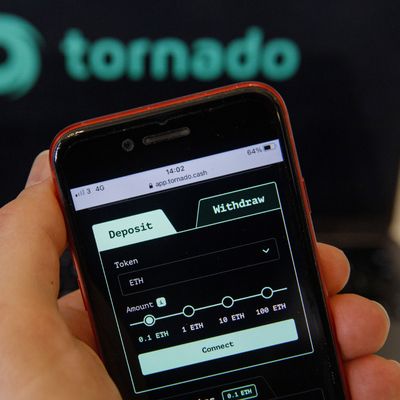
On Friday, authorities in the Netherlands announced they’d arrested a man connected to Tornado Cash, a cryptocurrency program allegedly used by North Korea to launder about $500 million. But here’s the thing: The suspect isn’t accused of laundering money. The man, reported to be cybersecurity firm PepperSec CEO Alexey Pertsev, is a “developer,” someone who wrote code or otherwise had some hand in making a program used to erase fingerprints from digital-currency transactions. Sometimes that’s nefarious, but in other cases — like in people sending money to the Ukrainian resistance — there’s nothing wrong with it. The arrest set off alarm bells that privacy-minded coders, and freedom of speech, are again under an Orwellian attack.
So far, what’s known about the case is scant. According to the Netherlands’ Fiscal Information and Investigation Service, the developer is “suspected of involvement in concealing criminal financial flows and facilitating money laundering through the mixing of cryptocurrencies,” which isn’t a whole lot of detail. The authority went on to hint that more arrests might be coming. “Involvement,” of course, can mean anything, and this is the central worry of crypto developers who have used services like Tornado Cash before, even Vitalik Buterin, the co-founder of Ethereum.
The case is setting up crypto mixers to be on the frontiers of speech, similar to the ways Wikileaks or encrypted-chat apps have been. Thanks to their initial use by drug markets like Silk Road, cryptocurrencies have gained a reputation as a safe way for criminals to transfer money without banks or other financial authorities meddling on the flow of money. This was never the case — as a few less-than-sophisticated alleged launderers found out this year — since there are public ledgers that record buyers and sellers. Mixers like Tornado Cash deliberately make it harder to track down where money comes from by using decentralized smart contracts that take in cryptocurrency from one person and allow them to withdraw an equivalent amount from a third party, which takes it in from other sources. There are many other mixers out there, as well as cryptocurrencies like Monero, that have similar privacy provisions baked into it.
Yes, crypto mixers make it hard to track who sends money where. That’s the point. Since the line between money and political speech has been blurred following the Supreme Court ruling in the 2010 Citizens United case, there are plenty of legitimate reasons to want to be able to send money anonymously — whether it’s to Canadian truckers protesting vaccine mandates or Occupy Wall Street protestors. The developer is expected to go before a judge Friday, but it’s not clear what will happen next or if U.S. authorities are interested in him. Tornado Cash, for its part, seems to be keeping a lower profile, as it hasn’t posted anything on its Twitter account about the arrest and its Discord channel went offline.






























